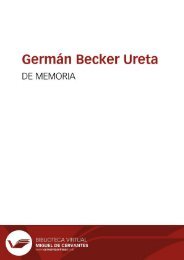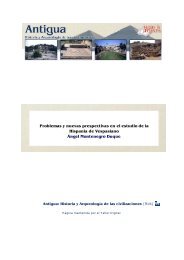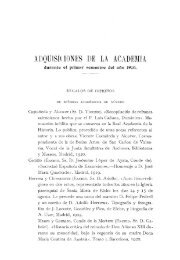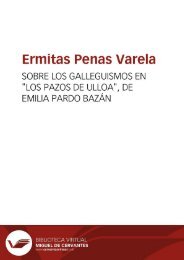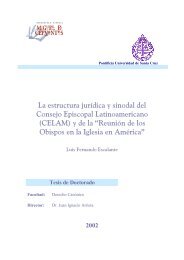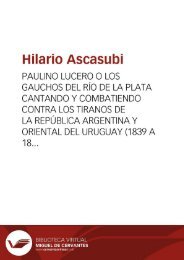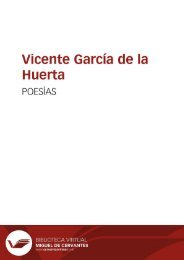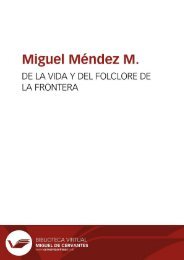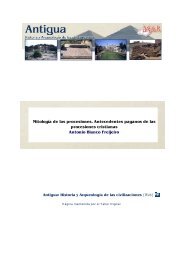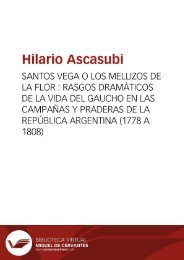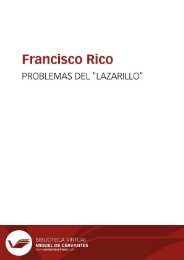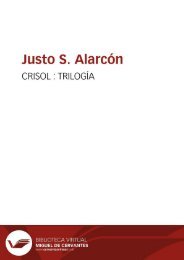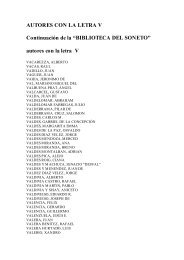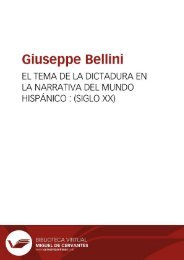You also want an ePaper? Increase the reach of your titles
YUMPU automatically turns print PDFs into web optimized ePapers that Google loves.
Anales galdosianos [Publicaciones periódicas]. Año XII, 1977<br />
El amigo Manso won little esteem from its contemporaries: a novel without plot or action, they<br />
called it; Clarín, to the best of our knowledge, failed to review it; and Unamuno pretended not to have<br />
understood it. Early critics paid little attention to the fact that Chapter I and Chapter L constitute a<br />
frame that establishes Máximo Manso in his own words as a lie, a fictive invention. These critics read<br />
the novel as an autobiographical account or as a disquisition on « krausismo » and late nineteenth-<br />
century educational theories 121 . Even Casalduero, in his predilection to classify, still labels El amigo<br />
Manso as a naturalistic novel in which <strong>Galdós</strong> exposes society to objective, scientific observation 122 .<br />
Vast as <strong>Galdós</strong>' readership has been, <strong>Galdós</strong> has yet to find his readers. The more recent commentators<br />
have tended to recognize the importance of the play on autonomy in this direct antecedent of Niebla<br />
, but in limited contexts or as a subservient component of the novel. Peter G. Earle, though concerned<br />
with other matters, has expressed well Máximo's duality as a creation: « El amigo Manso es la<br />
novela en que <strong>Galdós</strong> mejor sitúa a su protagonista en la circunstancia del novelista mismo. Es un<br />
espíritu autónomo que lleva su 'apariencia humana' en calidad de prestada » 123 . Robert H. Russell<br />
has pointed to Manso's awareness of himself as a writer of fiction and says cautiously: «It is not<br />
entirely imprudent to suggest that El amigo Manso is as much concerned with literature as it is<br />
with education» 124 . However, he prefers to hover above <strong>Galdós</strong>' game as a knowing non-participant,<br />
assumes that the unnamed character in the novel to whom Manso refers as his creator is <strong>Galdós</strong>, and,<br />
collating his reading of the novel with the author's career, limits his thesis to <strong>Galdós</strong>' discovery that<br />
the humanity of his fictional creations is deepened if his own ideological posture does not obtrude<br />
onto their reality. Gustavo Correa has understood and insisted more than any other critic that <strong>Galdós</strong><br />
121 Emilio G. Gamero y de Laiglesia, <strong>Galdós</strong> y su obra , II. Las novelas (Madrid: Imprenta Ruiz,<br />
1934), discerned that Máximo Manso is both « un ser efectivo y real » and « hechura de la fantasía del<br />
novelista » (p. 86) but, not knowing what to make of that, made nothing of it. Walter T. Pattison, given<br />
to positivistic sleuthing, rejects out of hand the denomination of Manso as an autonomous character<br />
(« El amigo Manso and el amigo <strong>Galdós</strong> », Anales Galdosianos , 2 [1967], 151, n. 72).<br />
122 Joaquín Casalduero, Vida y obra de <strong>Galdós</strong> (1843-1920) , 3rd ed. (Madrid: Gredos, 1970), p.<br />
223; reprinted from Homenaje de poetas a Pierre Darmangeat (Paris: Les Éditions Polyglottes , 1966),<br />
pp. 83-90.<br />
123 « La interdependencia de los personajes galdosianos », Cuadernos Hispanoamericanos , No.<br />
250-252 (1970-71), 129.<br />
124 « El amigo Manso : <strong>Galdós</strong> with a Mirror», MLN , 78 (1963), 167.<br />
89



